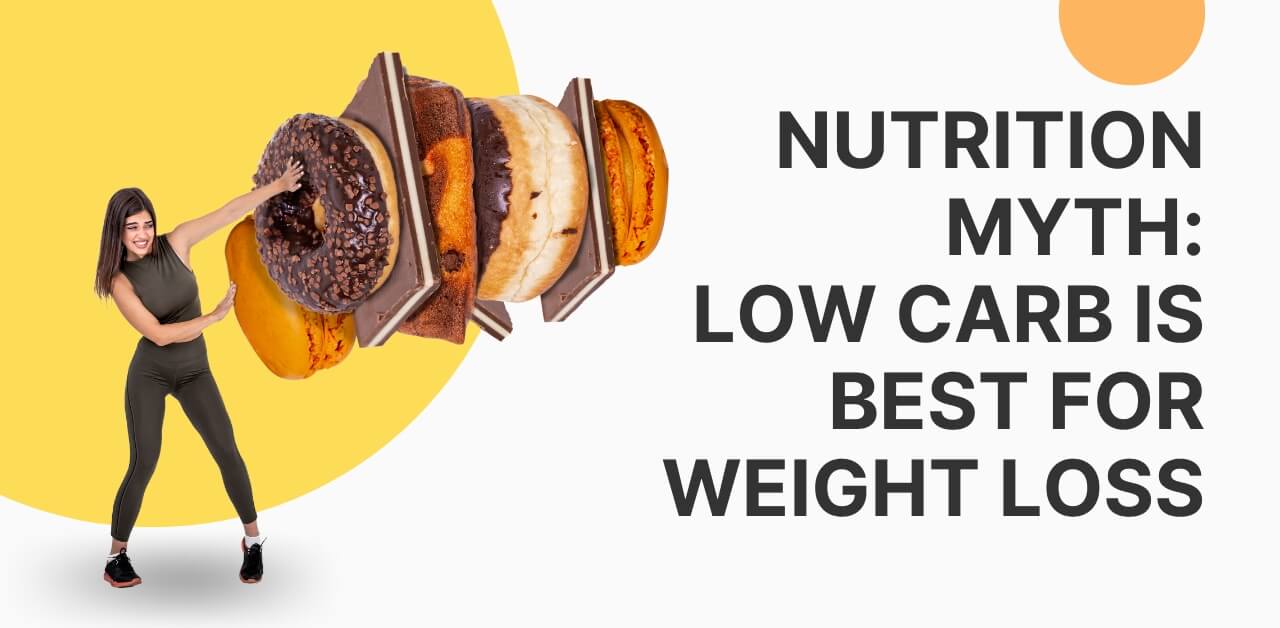The ratio of carbs to fat in a diet doesn’t affect weight and fat loss. Given an equal amount of energy consumed, and assuming you are in an energy (calorie) deficit, you’ll lose the same amount of weight whether you follow a high-carb or high-fat diet.
PMID: 23035144, 26527511, 16476868, 9497169, 1734671
Let’s look at the research in favour of low carb and why the industry tended to go towards this approach to begin with.
A 2004 study titled “A low-carbohydrate, ketogenic diet versus a low-fat diet to treat obesity” looked at whether low carb or low fat was best.
PMID: 15148063
People in the low-carb group lost 20.7 pounds (9.4 kg) of their total body weight, compared with 10.6 pounds (4.8 kg) in the low-fat group.

People in the low-carb group lost 9.4kg of fat, compared with 4.8kg in the low-fat group. However, the low-carb (keto) group lost 3.3kg of fat-free mass (which we don’t want to lose), and the low-fat group lost 2.4 kg of fat-free mass.
Fat-free mass includes muscle mass. So whilst the keto group lost more fat, the group also lost more muscle. The study however had participants on a 500 to 1000-calorie deficit diet. This is a huge range, and it would be better to see more control with the calorie intake and exercise output.
In a 2018 12-month weight loss diet study, there was no significant difference in weight change between a low-fat diet vs a healthy low-carbohydrate diet.
PMID: 29466592

The graph above shows weight changes differed drastically within both groups — ranging from 70 lbs lost (-32 kg) to 24 lbs gained (+11 kg). Each bar represents the weight change of a single participant.
Even accounting for the ≈10% of participants who gained weight, the combined weight loss in this study was an impressive ≈6,600 lbs (3,000 kg).
A 2021 study compared the effect of two diets on people with excess weight.
PMID: 33479499
Each diet lasted for 2 weeks. One comprised around 10% carbohydrate and 75% fat, while the other consisted of approximately 75% carbohydrate and 10% fat.

Participants on the high-carb diet consumed FEWER calories (an average of 689 calories less) and reported that they felt just as satisfied after eating compared with those on the low-carb diet.
Only the high-carb diet resulted in a significant loss of body fat. Filling your muscles with glycogen provides your body with more fuel to train. This will allow you to exercise at a higher intensity for more extended periods of time and perform well in your daily activities.
During intense activity, glycogen stores are depleted from our muscles. This leads to us feeling tired and fatigued. Without adequate carb consumption, you will not recover from exercise efficiently.
Poor recovery can also lead to muscle loss as you will be unable to train at a high intensity. You may be unable to lift the same weights as last time. Carbs have water and electrolytes to help rehydrate us after exercise. By not consuming enough carbs you are increasing the chances of dehydration.
Insufficient carbohydrates can also lead to a reduced quality of sleep. Multiple studies have shown that for weight loss, neither low-fat nor low-carb is superior as long as there’s no difference in caloric intake or protein intake.
There is no “best diet”. Both low-fat and low-carb diets can work for weight loss. The diet that will work for you is the one you can stick to in the long run.
It’s also shown that increasing carbs in a diet can help reset hormone levels to baseline after times in a deficit. This is where the refeed or maintenance days approach comes from. The increase in calories comes from carbohydrates.
“On the note that nutritional essentiality is goal-specific (rather than merely required for survival), the goal of optimal health/maximal prevention of chronic disease would simply not be possible on a zero-carbohydrate diet. A major shortfall would be the absence of dietary fibre, the health benefits of which were discussed previously. So, carbs are essential for optimal health.”
A recent and huge review by Ashtary-Larky examined ketogenic diets (low carb, high fat) from 1921 to the present day. They found that people who do resistance training lose more lean mass than higher-carb diets. (This was shown in the first study in this segment too).
A 13-study systematic review and meta-analysis led by the same authors reinforce the finding that restricting carbohydrates to ketogenic levels (~50 grams per day) is counterproductive to the goal of maximising rates of muscle gain.
Overall? Neither is superior for fat loss, but carbs play an important role in performance and muscle retention.
Next Steps
If you’re not specifically training for athletic performance, there’s no set amount of carbohydrates you need.
The quantity depends on your overall energy needs, food preferences, and what your body can handle.
• However, if you’re looking to build strength, power, or muscle size, aim for 3-8 grams of carbohydrates per kilogram of your body weight.
• For those focused on endurance sports, the goal should be 6-12 grams of carbohydrates per kilogram of body weight.
